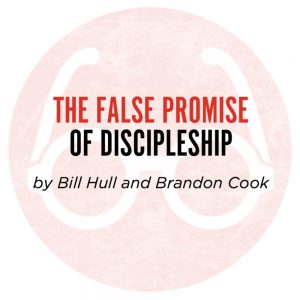How Does the Disciple Live?
By Dallas Willard
How the disciple lives naturally comes out of who the disciple is.
As Jesus’ disciple, I am his apprentice in kingdom living. I am learning from him how to lead my life in the Kingdom of the Heavens as he would lead my life if he were I. It is my faith in him that led me to become his disciple. My confidence in him simply means that I believe that he is right about everything: that all that he is and says shows what life is at its best, what it was intended by God to be. “In him was life and the life was the light of men.” (John 1:4 NAS)
Being his apprentice is, therefore, not a matter of special “religious” activities, but an orientation and quality of my entire existence. This is what is meant by Jesus when he says that those who do not forsake all cannot be his disciple. (Luke 14:26 & 33) The emphasis is upon the all. There must be nothing held of greater value than Jesus and his kingdom. He must be clearly seen as the most important thing in human life, and being his apprentice as the greatest opportunity any human being ever has.
When this orientation of the whole life has come upon us and been accepted, then the grace that brought it can begin to move throughout every aspect of what we are and do. Grace is God acting in our lives to bring about what we do not deserve and cannot accomplish on our own. But we are not passive in this process. We are commanded to put off the old person and put on the new. (Col. 3:9-10; Eph. 4:22-24) We are told to “grow in the grace and knowledge of our Lord and Savior Jesus Christ.” (II Peter 3:18) This is something for us to do, and , although we cannot do it on our own, it will not be done for us. Being alive in Christ means that we can do whatever it is we need to do to increasingly take on his character and live in his power.
The ultimate outcome of this process is expressed by Paul the Apostle: “Whatever you do in word or deed, do all in the name of the Lord Jesus, giving thanks through Him to God the Father.” (Col. 3:17) And again: “Whether, then, you eat or drink or whatever you do, do all to the glory of God.” (I Cor. 10:31) My entire life is to be caught up in the life that Jesus Christ himself is now living on earth and will continue throughout eternity. And that is why being his apprentice is the greatest opportunity any human being ever has. That is how grace possesses our whole life. That is how those “saved by grace through faith…are His workmanship, created in Christ Jesus for good works, which God prepared beforehand, that we should walk in them.” (Eph. 2:10)
Living as Jesus’ disciple, I am learning from him how to lead my life in the Kingdom of the Heavens everywhere I am, in every activity I engage in. There are three dimensions of this learning.
First, I am learning to do the things which Jesus explicitly said to do. It is quite literally nonsense to call Jesus “Lord,” and not do what he said. “Lord” means nothing in such a case. (Luke 6:46-49) But because I do accept him as Lord, his instructions on behavior are my treasures for living life. Of course I cannot do what he said by just trying. I must train! I must, through appropriate courses of action, become inwardly transformed by grace to become the kind of person—in my inmost thoughts, feelings, attitudes and directions of will—who will routinely do the kinds of things he said to do. I will then not be governed by anger, contempt or lust. And I will be able to bless those who curse me, love my enemies, and so forth, because I am one in whom the character and power of Christ has come to dwell through the processes of discipleship to Christ.
Second, I am learning to conduct the usual activities of life—in home, school, community, business and government—in the character and power of Christ. Jesus himself, of course, spent most of his life on earth as an “independent contractor” or businessman. Jesus could have led the ordinary life of the ordinary citizen in all of its legitimate respects. He can show us how to live now, as a mother or father, banker or computer programmer, teacher or artist, in the Kingdom of the Heavens. His character and power and personal guidance will lead us into life as it should be in all of these areas of human existence.
Third, I am learning to exercise the power of the kingdom—of Christ in his Word and Spirit—to minister good and defeat evil in all of the connections of earthly existence. “God anointed Jesus of Nazareth with the Holy Spirit and with power, and He went about doing good, and healing all who were oppressed by the devil; for God was with Him.” (Acts 10:38) Apprenticeship to Jesus means that, in tiny steps, we learn to exercise this power seen in Jesus. Growth in character is primary, for power requires substance of character if it is to be used for Christ’s purposes. Christ had no character problems, but we do. Prayer, in its aspect of training for Kingdom life, is primarily a matter of learning to exercise power in a way that is both profitable and safe. Through it, in the usual case, we take our first steps in “receiving abundance of grace” and “reigning in life by One, Jesus Christ.” (Rom. 5:17) So character is more important than power for us, but it does not replace power. The fruit of the Spirit (thoroughly Christlike character) flourishes only in a context of regular communal manifestation of the gifts of the Spirit. And this manifest power of the Spirit in life is not something restricted to “church services.” In this matter also, Jesus is our example and our teacher. He acted with the Kingdom wherever he was. The “rivers of living water” which, as he said “shall flow from the center of the believers life” (from his “belly,” John 7:38), will continually flow from us, as it did from him, wherever we may be.
Now growth in grace—in God acting in our life—is something we must plan for by regular engagement in activities that enable us to receive God’s grace in all areas of our spirit (will), thoughts, feelings, body, social relations, and the deepest depths of our soul. We have been thoroughly “occupied” by sin—which is mainly just exaltation of “me,” and the consequences thereof. Our intention as apprentices of Jesus is to become the kind of person who lives in the character and power of Christ. We must, then, do those things that will enable us to become that kind of person, from the inside out—through appropriate actions and practices.
Such actions and practices are “disciplines for the spiritual life.” They are well-known from observing Christ and his people. They include such practices as solitude, silence, fasting, study, worship, fellowship, prayer, etc. There is no complete list of such practices, though some are more well-known and widely practiced than others, because they are more central to breaking the power of indwelling sin and increasingly filling our life with grace. Disciplines are, in essence, activities in our power that enable us, by grace, to do what we cannot do by direct effort—by “just trying.” We cannot, by just trying, succeed in loving our enemies and heartily blessing those who curse us. But by a wise practice of disciplines in the presence of Christ, we can become people who will routinely and easily do so.
In disciplines we need to be informed and experimental. They are not righteousness, but wisdom. We must be practical with them, and not picky. We must not be ‘heroic’ or think we are earning anything from God. Disciplines for the spiritual life are places in which we meet with Jesus to be taught by him, and he is our guide into how they are best practiced. We should not be overly concerned about how others do them. In a very short time Jesus will lead us into the practice of them that is best for us.
The crucial thing is that, as disciples, we have a plan for carrying out the decision we have made to devote ourselves to becoming like our Master and Lord—to increasingly living in the character and power of Christ. Disciples are those who, seriously intending to become like Jesus from the inside out, systematically and progressively rearrange their affairs to that end, under the guidance of the Word and the Spirit. That is how the disciple lives.


![Discipleship Resource of the Year: Conversion & Discipleship [Award]](https://staging.discipleship.org/wp-content/uploads/2017/04/b_conversion-300x300.jpg)


